Birth on the 30th of June 1932, in Montreal, of Alan Frank Glass, second son of Frank Park Glass and Myrtle Palmer
1932
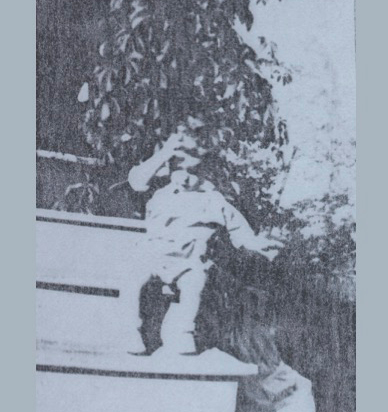
Alan Glass at age one, Mount Bruno, Quebec, 1933

Alan Glass at age one, Mount Bruno, Quebec, 1933
Birth on the 30th of June 1932, in Montreal, of Alan Frank Glass, second son of Frank Park Glass and Myrtle Palmer
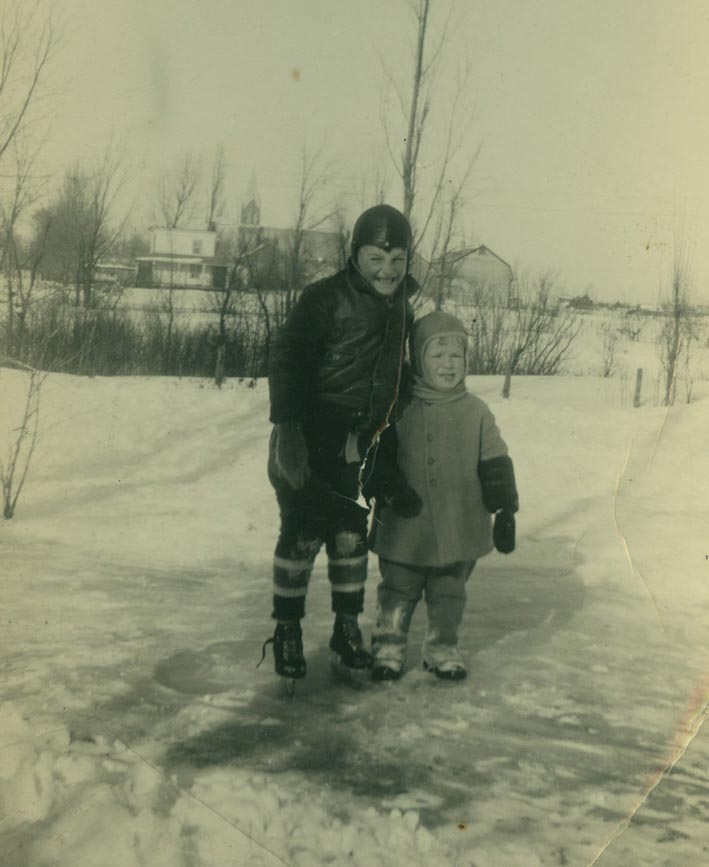
Alan Glass with his elder brother William, St. Bruno, Quebec, 1936
Alan and his brother William, three years his elder, spend every summer at a house on the edge of vast forests and amid orchards on the slopes of Mount Bruno, not far from a golf course where their father worked since its inauguration in 1922.
Their father is the nephew of Willie Park Jr., the renowned golf course architect and leading golf ball and golf club manufacturer of his time. During these years, the children were shuttled back and forth between Montreal and their summer house on Mount Bruno.
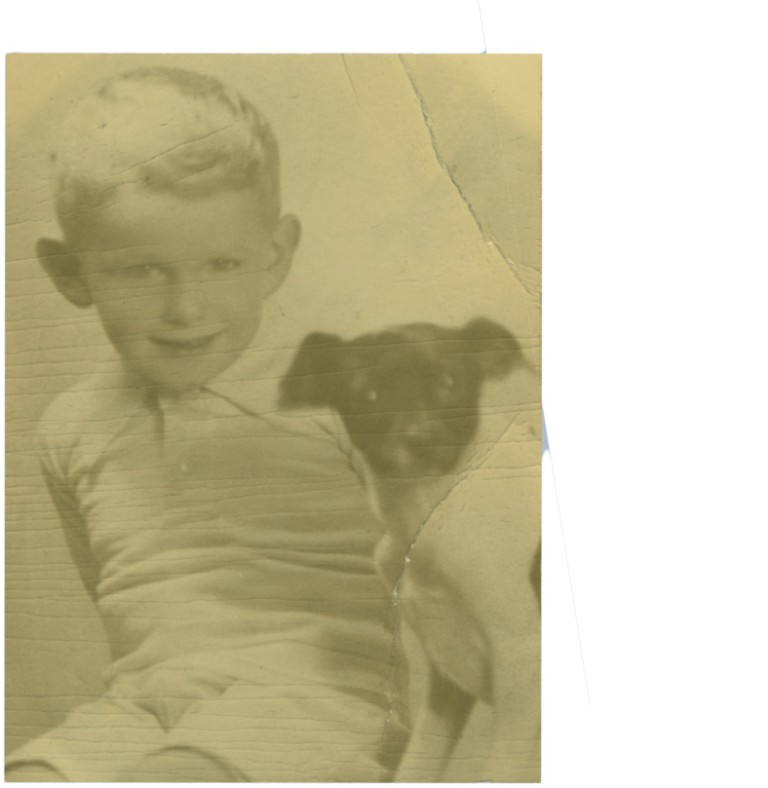
Alan Glass aged 3 Arless Studio Montreal, 1935
The family moves to a house near a lake close to the village of St. Bruno de Montarville. Alan is a strange, solitary and highly sensitive child; he lives in a world where the real and the imaginary are indistinguishable. He possesses a great treasure: one provided by a child’s freedom to create spontaneous associations, the privilege of a still pure mind, a way of perceiving things that will remain with him throughout his life. These years spent in an entirely French-speaking environment will be decisive in the manner in which his future life unfolds.
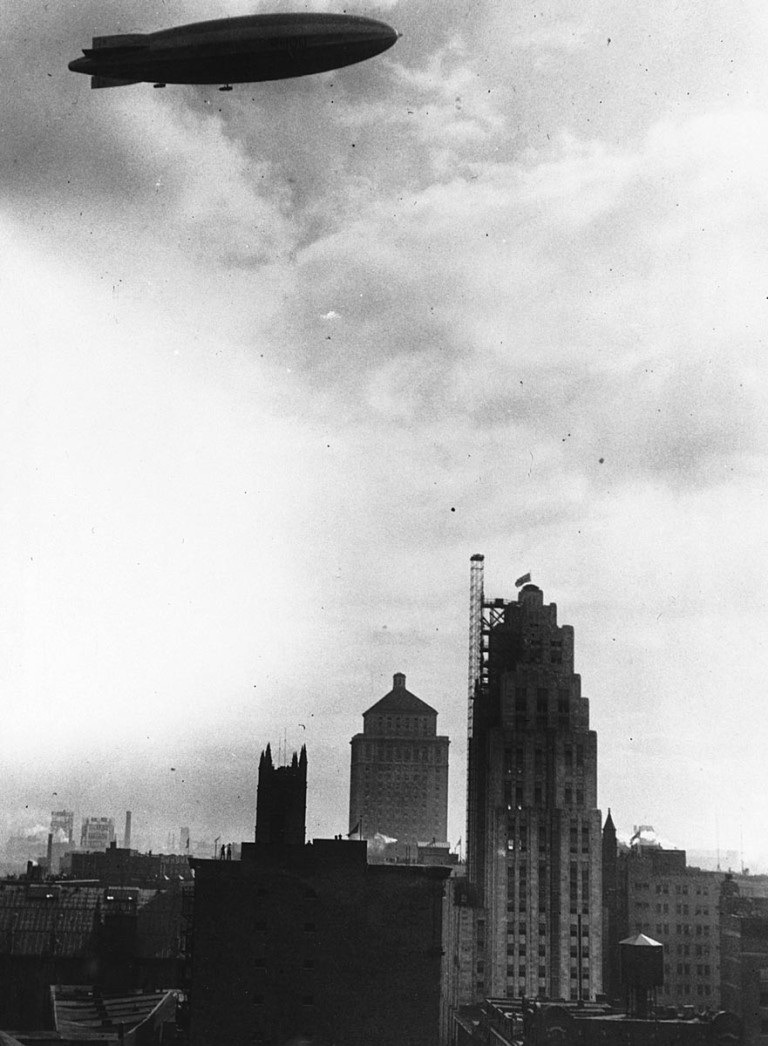
St. Lambert, Montreal
Another move, to St. Lambert, a small town on the south shore of the
St. Lawrence River on the outskirts of Montreal.
This change and his enrollment at an English-speaking school are traumatizing; he remains in the first year of primary school three years running, causing his parents concern over a child characterized by teachers as mentally retarded. In reality, the child is dyslexic.
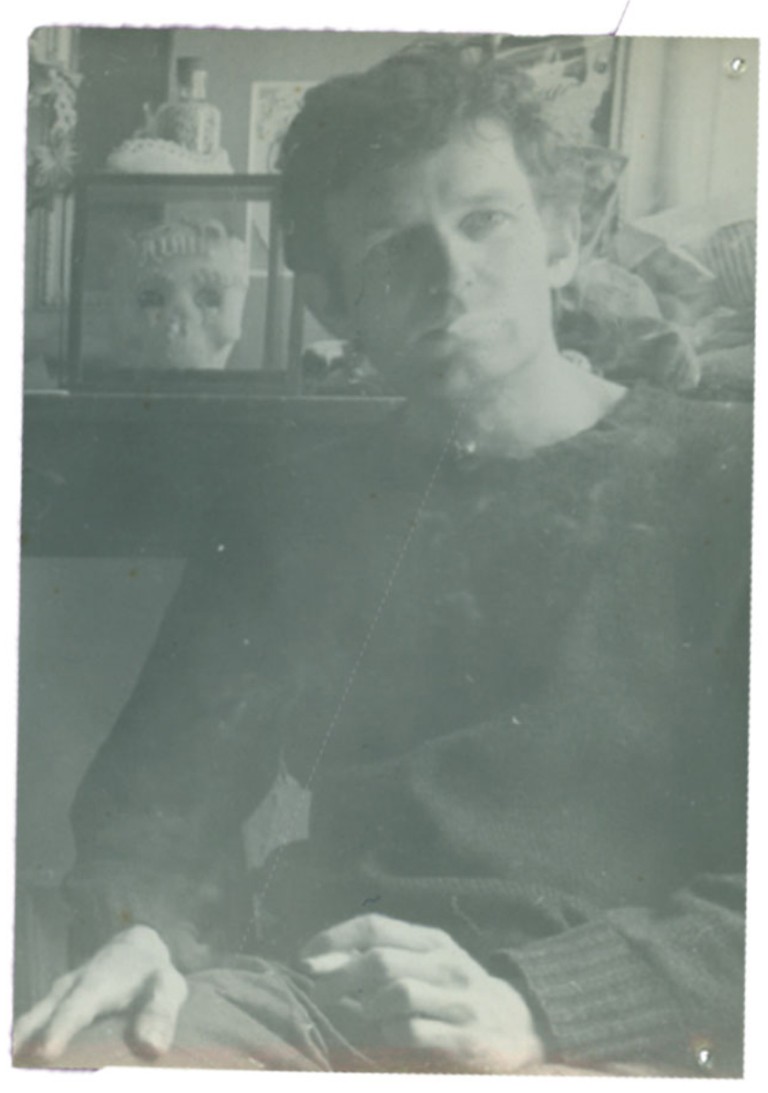
With difficulty he continues his studies at a high-school where he is constantly on the verge of being expelled for insubordination. He is a loner, steering clear of most of his classmates.
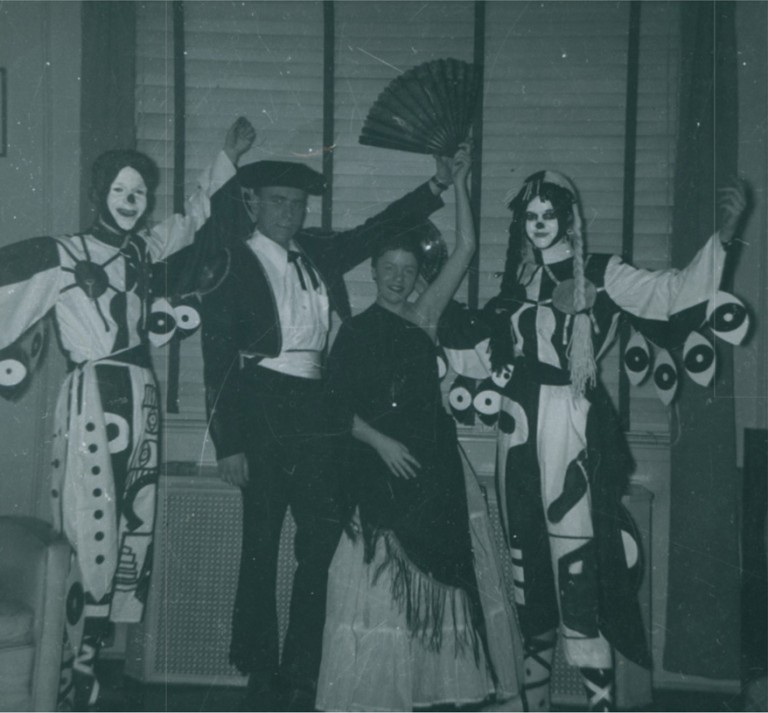
Ball, École des Beaux Arts, Montreal, c.1949–1950
He enrolls in evening drawing classes at l’École des Beaux Arts in Montreal.
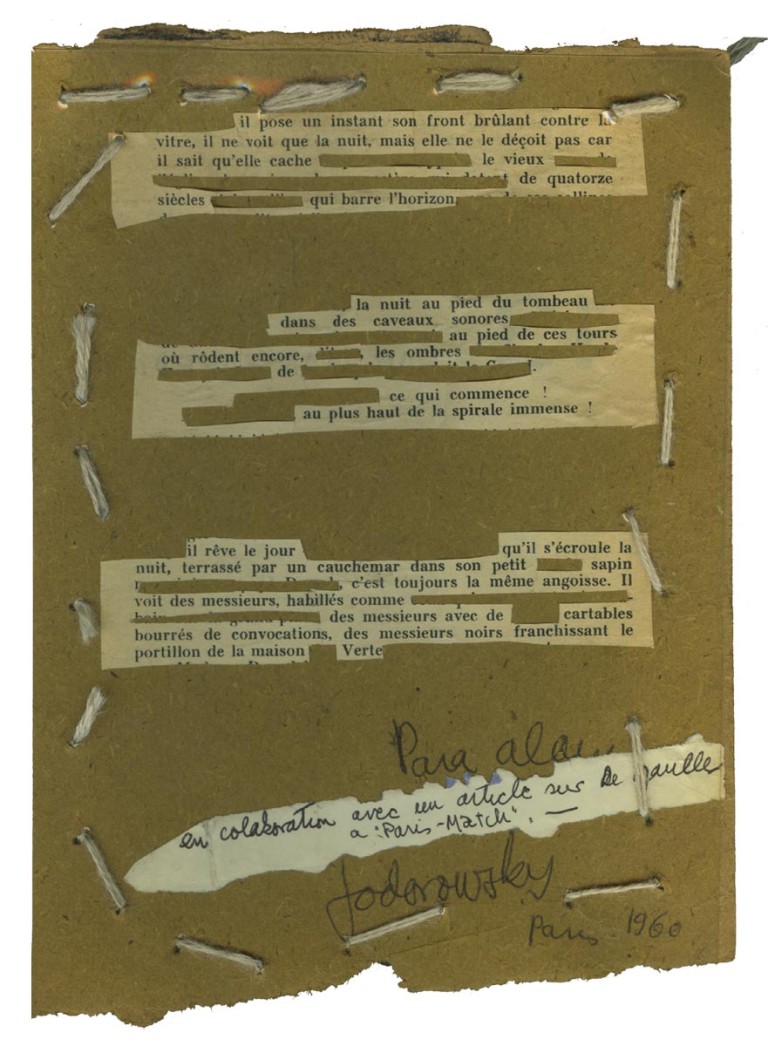
Spontaneous intervention by Alejandro Jodorowsky in a speech by Charles de Gaulle published in Paris Match, 1960.
His father allows him to sit for the entrance exam to the É cole des Beaux Arts on the condition that he continues his high school education at night. At the École des Beaux Arts, he is immediatly admited into the second year and, after the first term, promoted to the third. Upon his return the following autumn, he enters the fourth year. The students point him out: he needed only two years to finish the four-year program. It seems he has found his path.
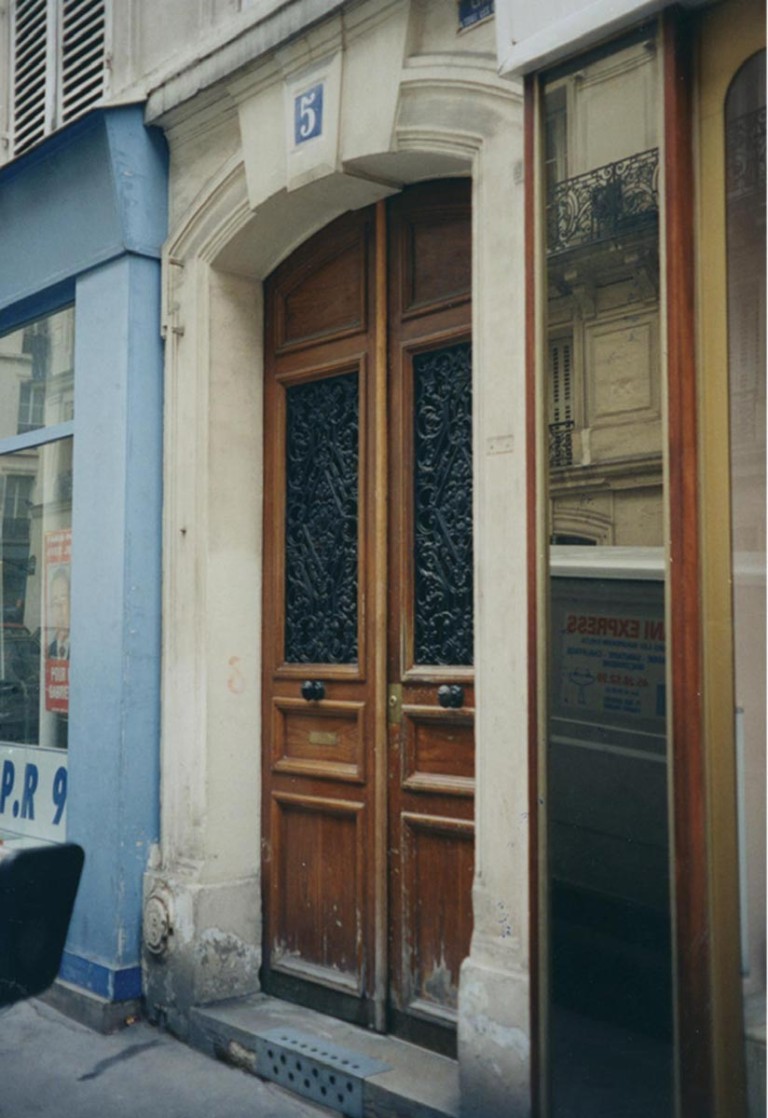
no. 5 rue Manuel
In early June, he leaves for France aboard the Italian steamship Homeric; he is only 19 years old. Upon his arrival in Paris, he settles in for the summer at the Sphinx, a former brothel on boulevard Edgar Quinet and visits the Loire region, Normandy and Brittany in the company of a painter-engraver friend, Solange Legendre. He discovers Île de Sein. In October, he moves to No. 5 rue Manuel, in Montmartre, into a garret apartment where he will live for ten years.
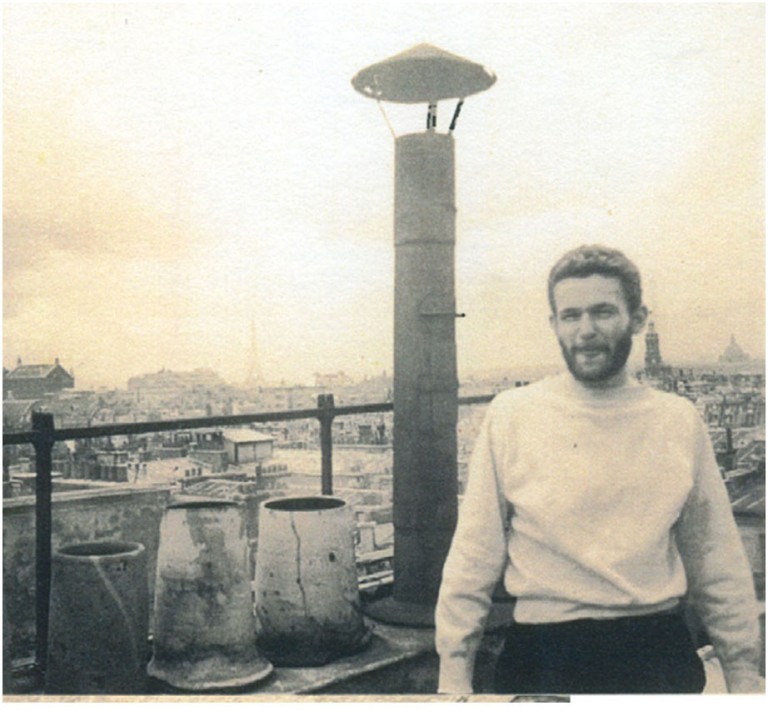
Alan on the roof of 5 Rue Manuel, 1953.
He enrolls in the École des Beaux Arts in Paris where he works at the lithography studio of Maurice Jaudon, at the Sorbonne and takes ethnography courses at the Musée de l’Homme. During winter, he travels to Switzerland, Germany, and Austria, and to Spain and Morocco in the spring.
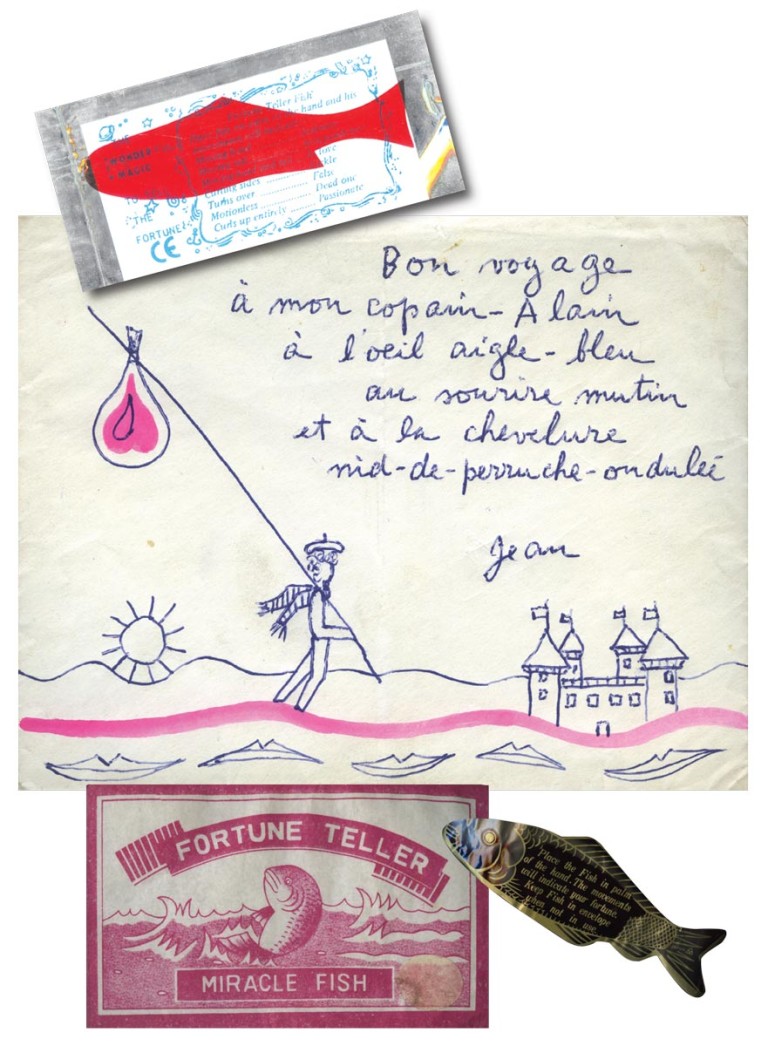
Letter from Jean Benoît, Paris, 1955.
He works at different jobs in Paris to earn a living. Over the summer, he travels to Greece for the first time, where he visits Mount Athos. He also makes a short trip to Istanbul.
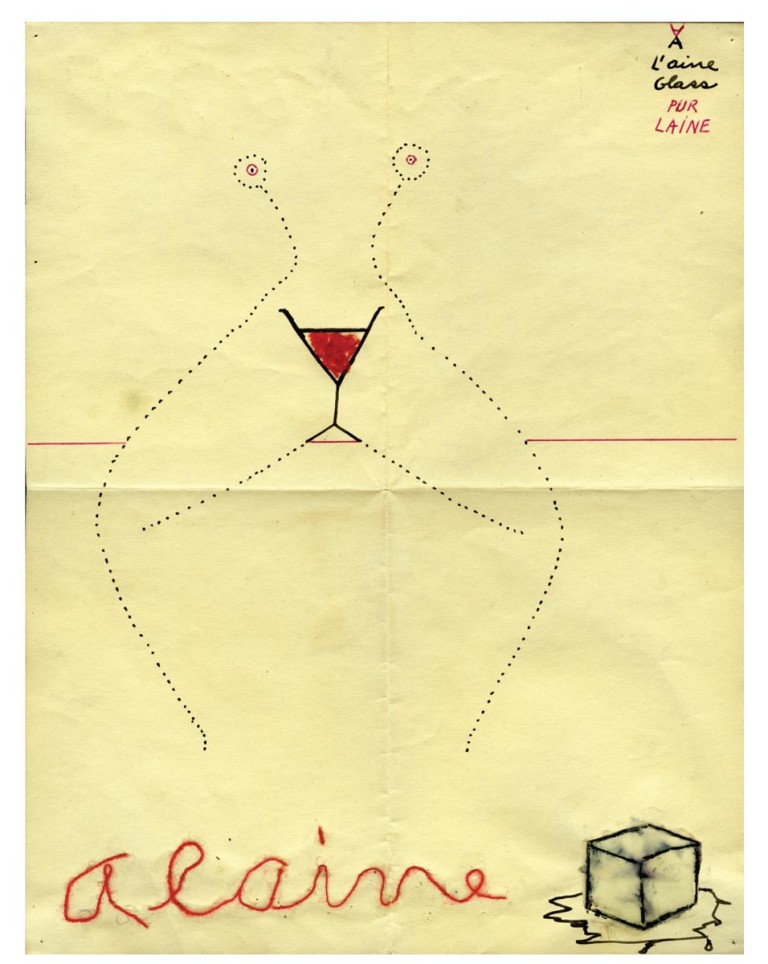
Alfred Pellan: Collage, circa 1953
Alan works every night from 9pm to 3am as the receptionist at the Club St. Germain des Prés, rue St. Benoît, where Paris’s smart set comes to hear jazz performed by the era’s best musicians. During these years he produces a series of ballpoint pen drawings.
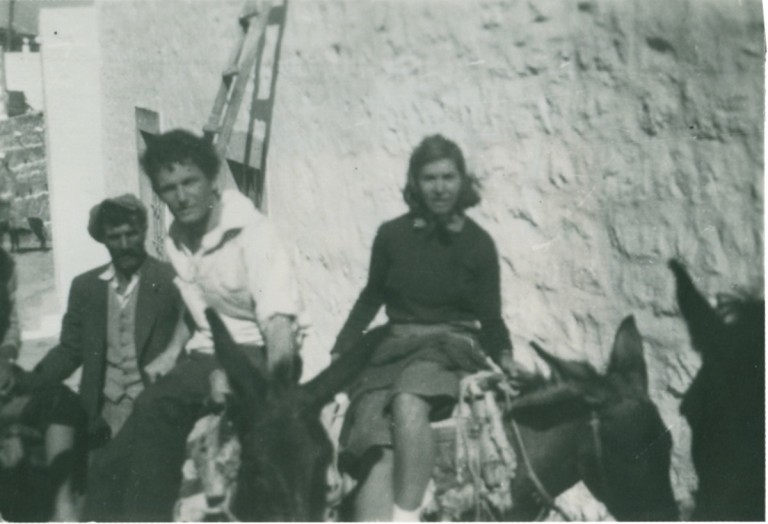
Island of Patmos, Greece. Greek mule driver, Alan Glass, Mimi Parent. Photo: Jean Benoît, 1957
In September, he travels to Berlin, Dresden, Prague and back to Paris, where he attends every exhibition. At the Étoile Scellée gallery, he leaves his address. A few days later, two youths who frequent surrealist group pay him a visit and, impressed by the drawings pinned on the walls of the room, insist for André Breton to have a look at them. It would be Jacques Sennelier who, one afternoon, takes him to rue Fontaine, where they are received by Breton and his wife Elisa. After giving Alan’s drawings his considered attention, Breton suggests organizing and exhibition with the assistance of Benjamin Péret, at Le Terrain Vague, the gallery of publisher Eric Losfeld, scheduled for January. He also invites Alan to the group’s meetings at a café on rue Vivienne near the Bourse (stock exchange). Intimidated by group, Alan’s visits to the café will be brief.
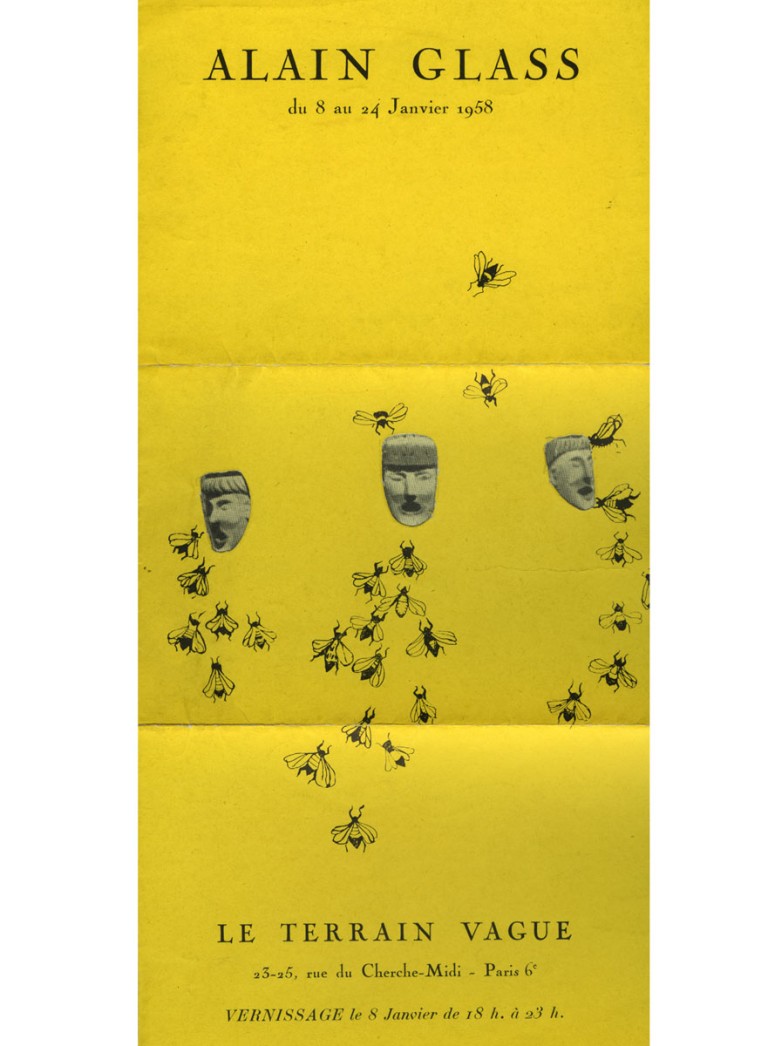
Invitation to the exhibition of drawings at Eric Losfeld’s gallery organized by André Breton and Benjamin Péret. Text by Alexandre Jodorowsky.
From January 8 to January 24, Alan has his first solo exhibit in Paris at Le Terrain Vague.
The vernissage is attended by Breton, Péret, André Pierye de Mandiargues and Matta, who buys one of his drawings.
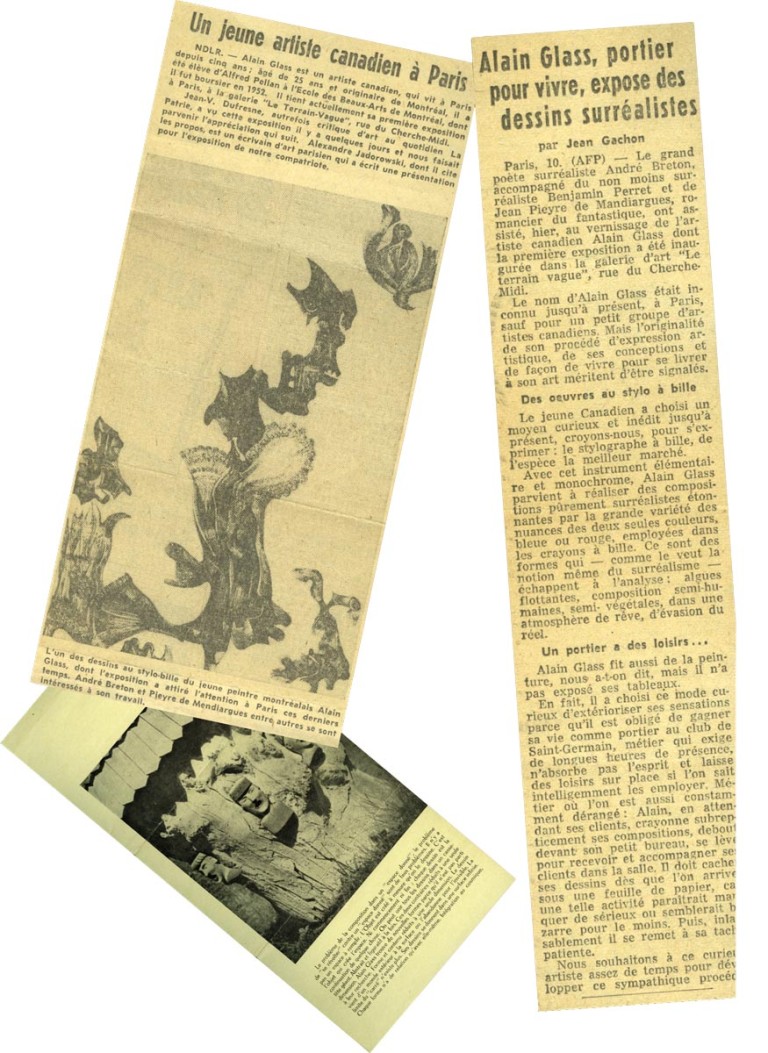
Final year at the Club St. Germain. He is dismissed for not being a good enough doorman: immersed in his drawings, he denies various celebrities entry to the club while admitting jazz-loving friends and local youths.
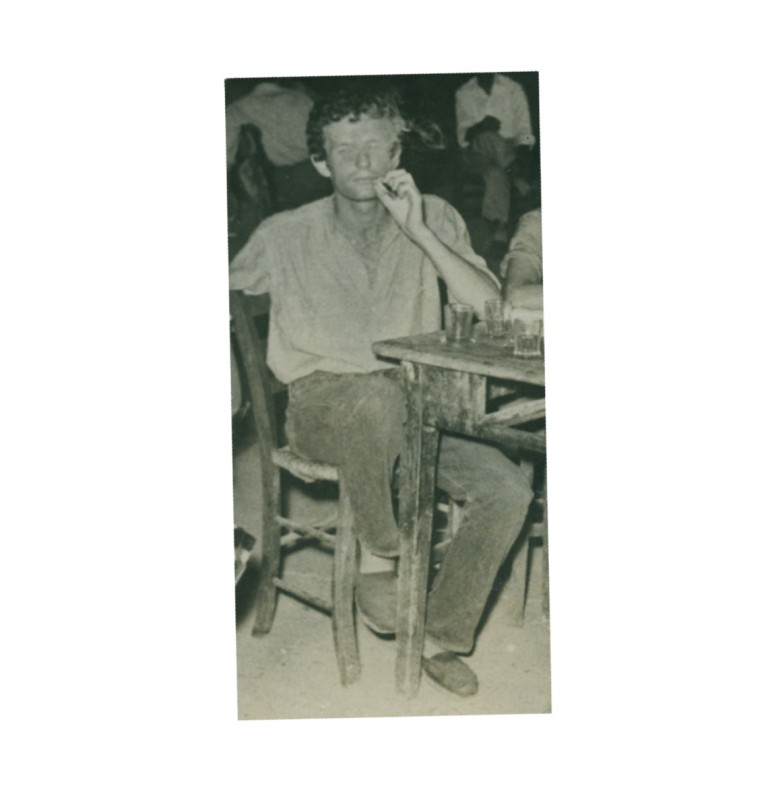
Gytheion, Peloponnesus, Greece summer, 1956
He works part-time at the Librairie Espagnole on rue Monsieur le Prince. That same year, at the studio of Yves and Aube Elléouët in Montparnasse, he sees a Mexican sugar skull for the first time.
This extraordinary encounter will lead to his departure a few months later from Barcelona to Mexico, aboard the cargo ship Monte Anaga, of the Aznar shipping company.
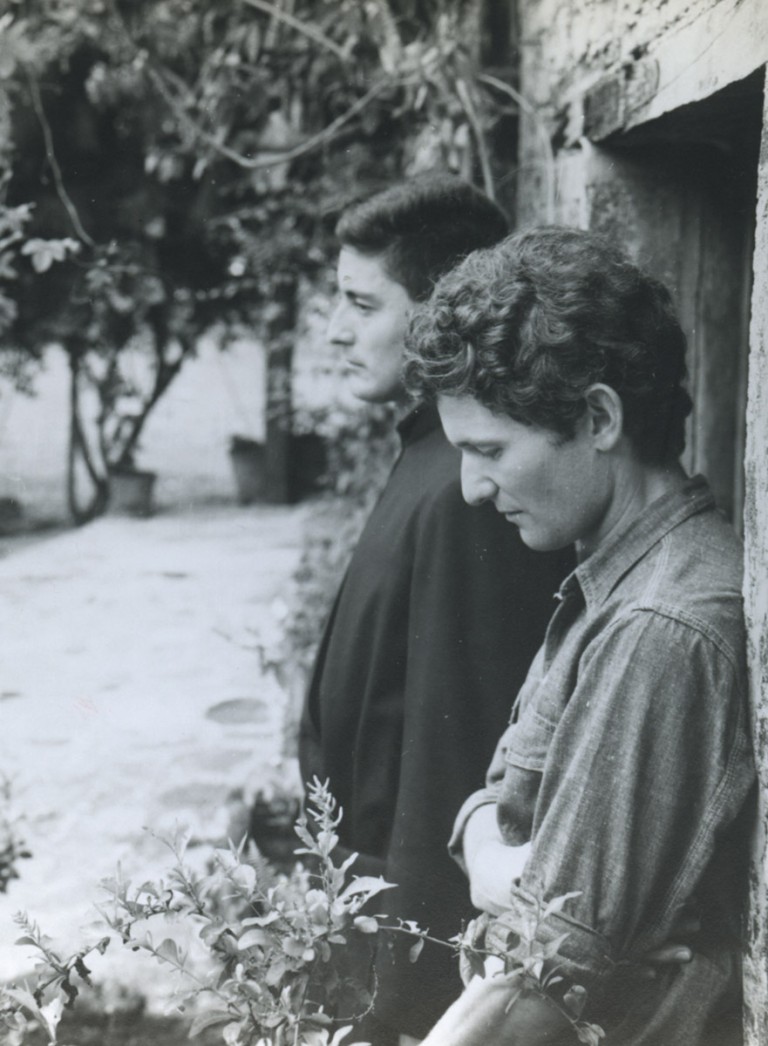
Alan Glass by Sheila Hicks, Taxco, 1962
In Mexico, he stays with his friends Alexandre and Denise Jodorowsky and in Taxco with his American artist and textile enthusiast, Sheila Hicks. The day of his arrival, Jodorowsky takes him to Leonora Carrington’s place. It will be the beginning of a long lasting friendship. He also introduced to Lilia Carrillo and Manuel Felguérez whom, in turn, will become his great friends.
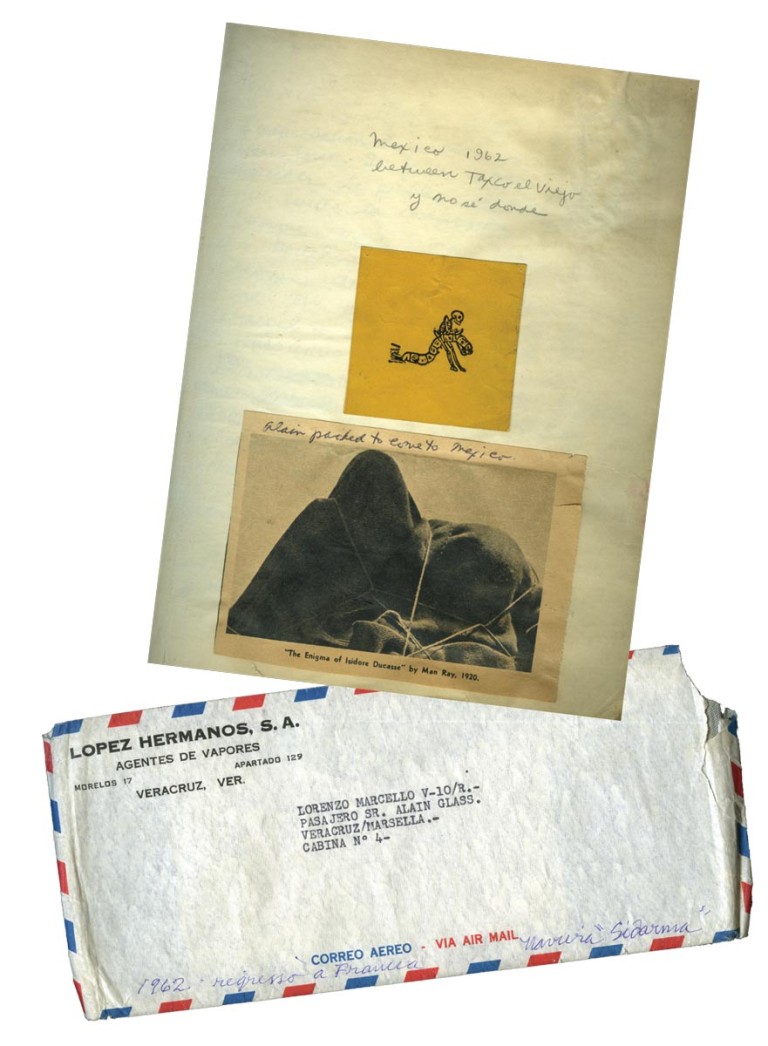
Clipings sent to me by Sheila Hicks when I left Paris in 1961 and when I left Mexico for Paris in 1962.
In June he sets off for Europe again. Two friends, the Japanese artist On Kawara and the actress Bernadette Landru drive him to the port of Veracruz where he boards the Italian freighter Lorenzo Marcello of Sidarma Lines, bound for Marseilles. Among the few passengers is Baroness Irana Frachon, a great traveler who had been the model for Brancusi’s “Muse endormie”, a friend of the singer Yvonne Georges and the surrealist Jacques Rigaud.

Alan Glass before 2 giant Judases, Mexican folk art. Easter 1964
He moves into an attic room (servant’s quarters) at No. 9 Sonora Street, where he paints, draws, and produces a series of boxes. At the request of the Spaniard Luis González Robles he collaborates with Manuel Felguérez in putting together a collection of Mexican folk art in preparation for an exhibit to be held at the Casa de las Américas, in Madrid, entitled
Arte popular desde Alaska a la Tierra de Fuego. Early in 1965, he moved to another attic room on 13 de Septiembre Street across from Chapultepec Park, where he prepared an exhibit for Canada scheduled for May. The evening of his departure he is invited to dine at Leonora Carrington’s, where he meets Teeny and Marcel Duchamp.
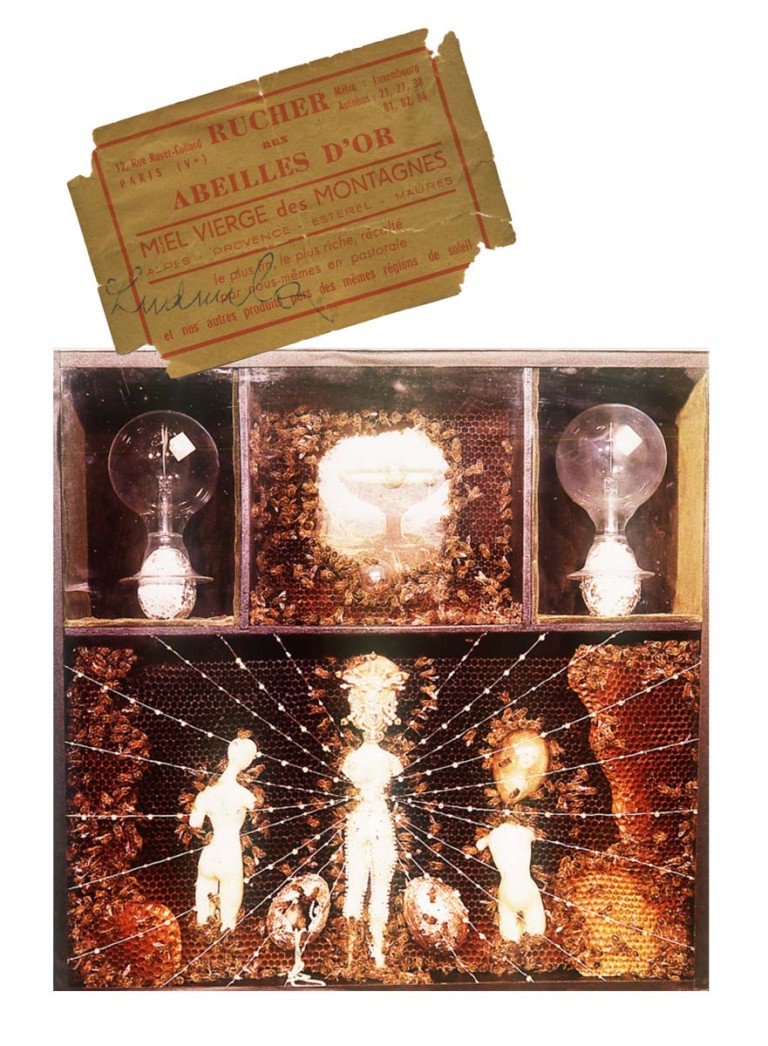
Untitled, 1965.
The Antonio Souza Gallery hosts his first solo exhibit in Mexico City titled Los Relicarios, from January 26 to February 26.
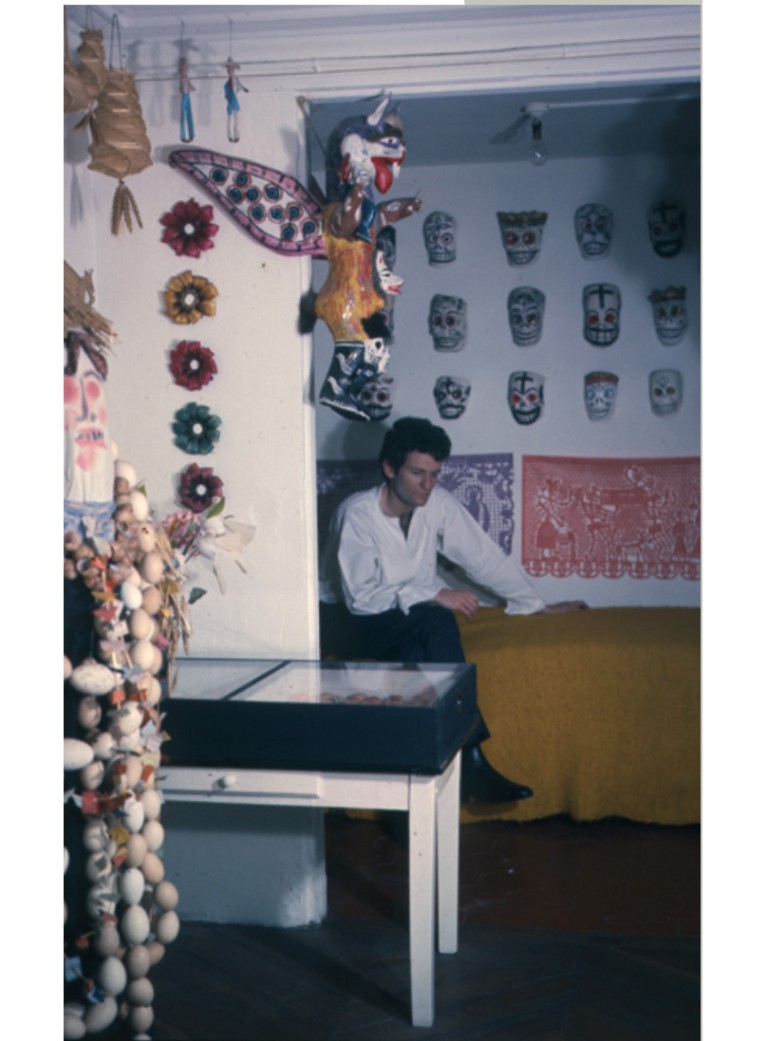
Studio, 5 rue Manuel, Paris, upon his return from Mexico in July 1962. Photo: Catherine Harly.
Receives a grant from the Arts Council of Canada.
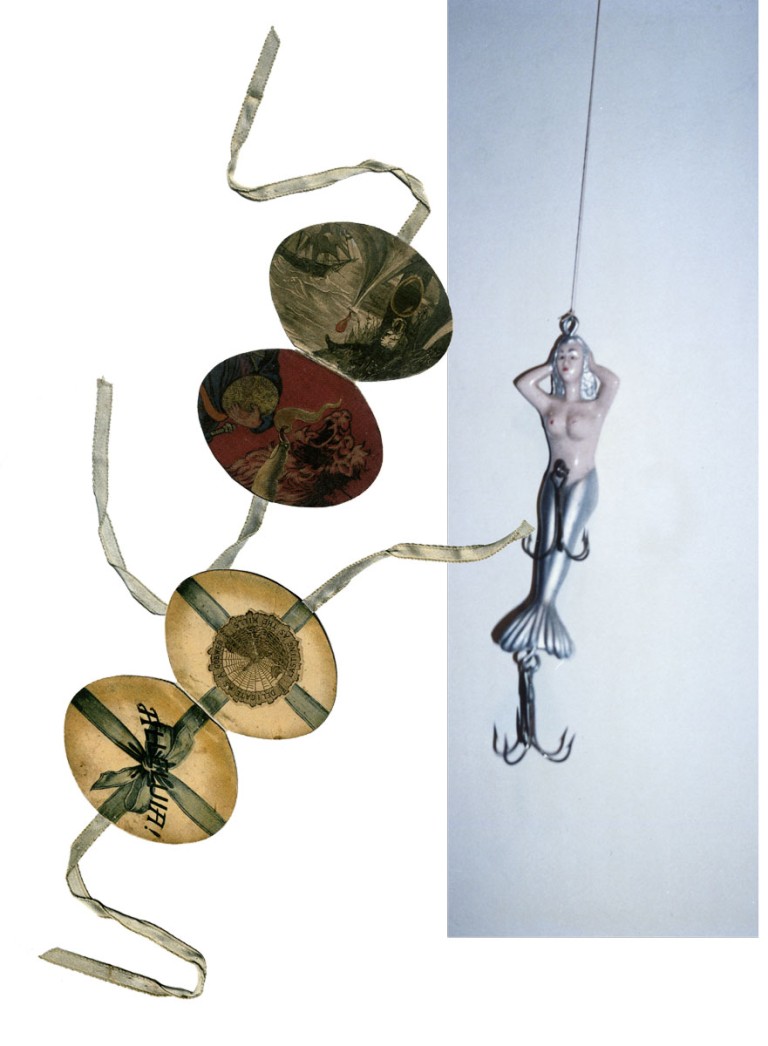
Collage, 1970
Arrives in Paris at the very start of the demonstrations of May 68. In September leaves for India where he will live for a year.
Travels in the subcontinent and Nepal.
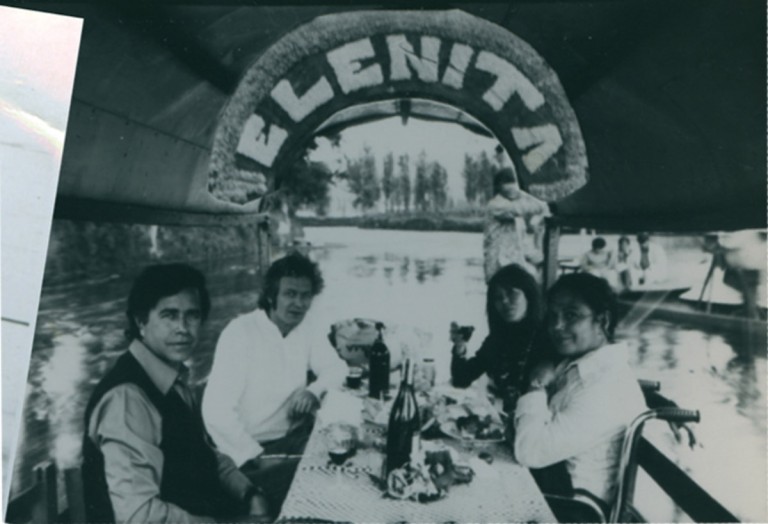
Manuel Felguerez, Lilia Carillo, Alan Glass, Teresa Pecanins. Xochimilco, ca. 1970
Return to Mexico, he moves into a modest apartment at Sinaloa No. 97 where he will live for the next twenty years.
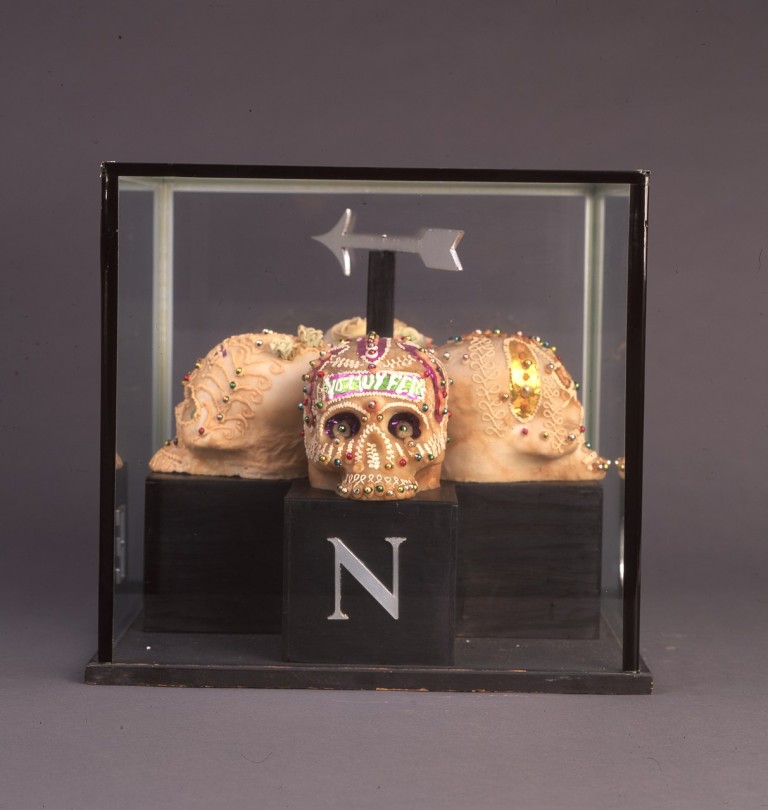
La Rose des Vents (Mexican sugar skulls, various materi- als), c. 1964. Musée du Québec, Québec.
Exhibits in Mexico City and Montreal.
The Musée du Québec and Ottawa’s Art Bank acquired several of his works.
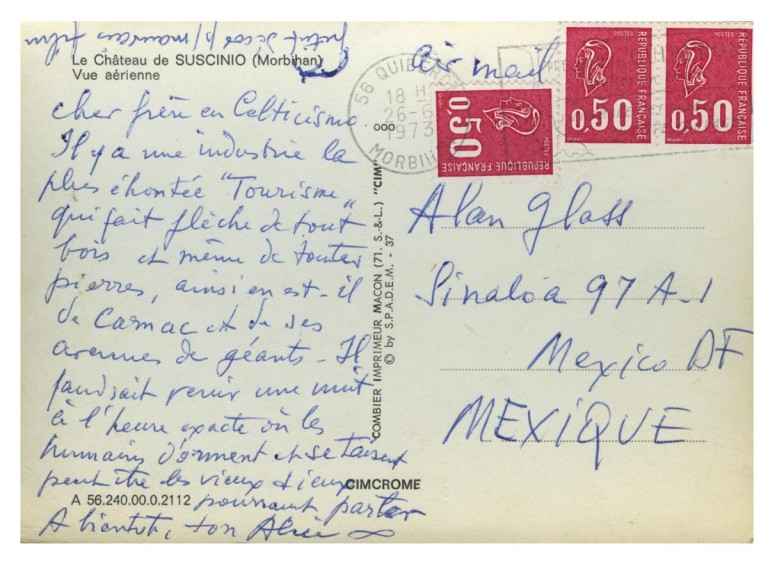
Postcard from Alice Rahon, summer 1973.
Works and exhibits in Mexico City.
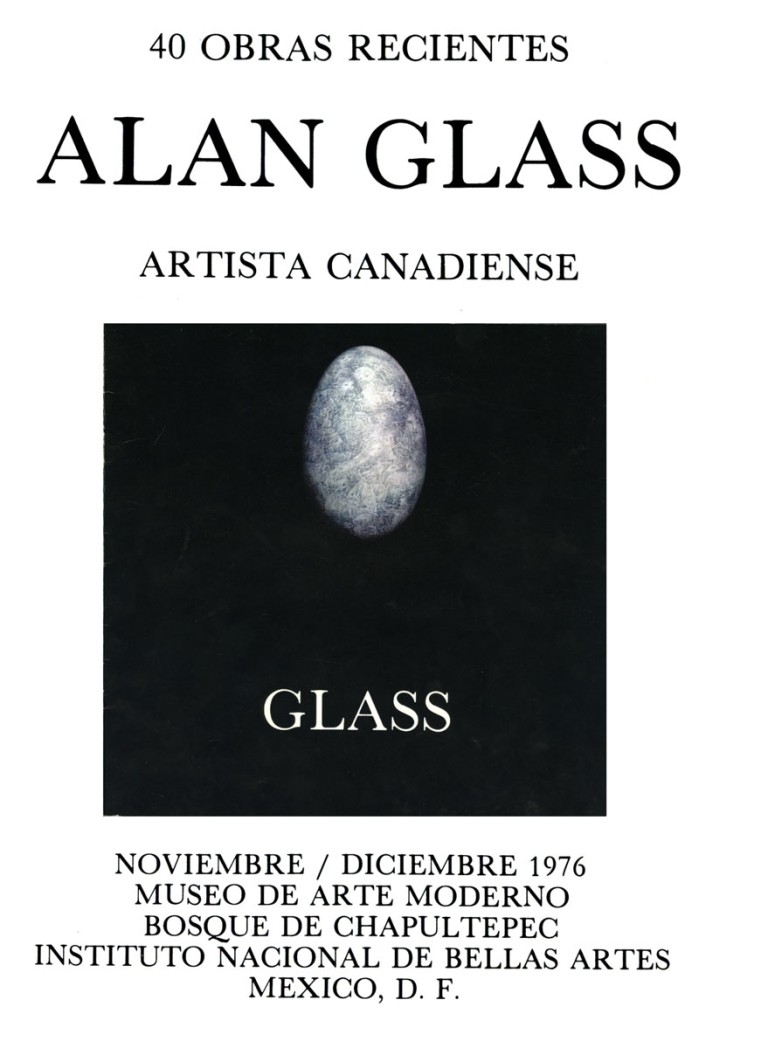
In November and December, he holds his first exhibition at the Museum of Modern Art in Mexico City at the request of Fernando Gamboa, the museum’s director.
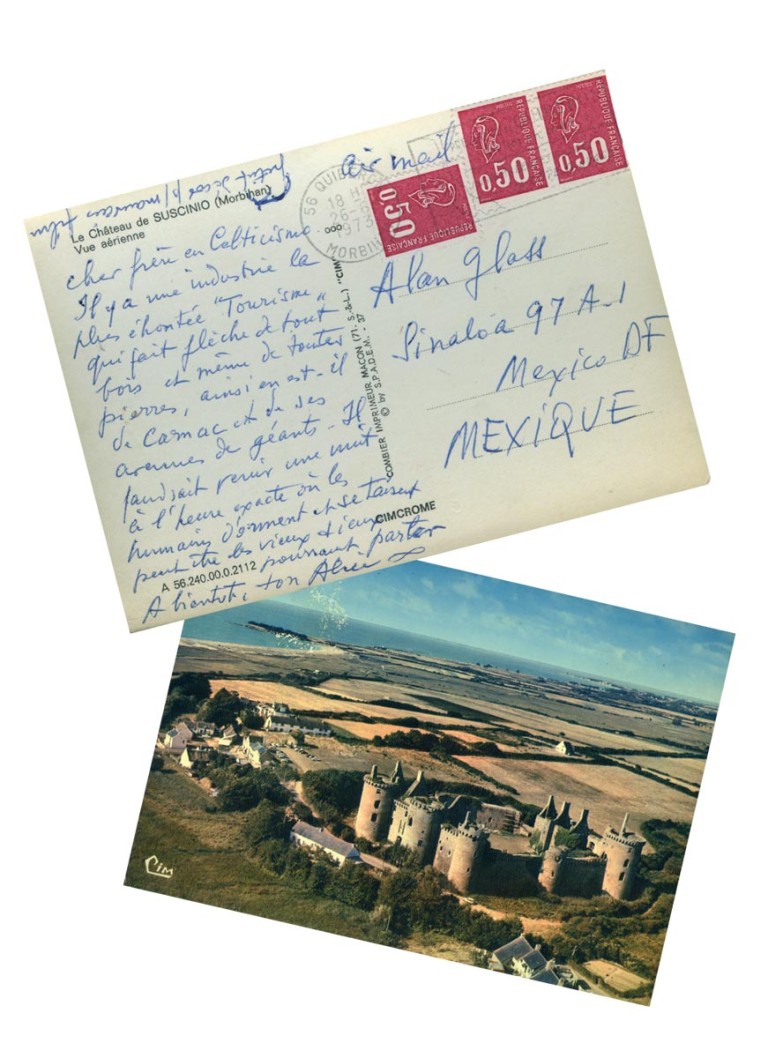
Postcard from Alice Rahon, summer 1973.
Later, the works shown in Mexico are shipped to Canada and exhibited at the Gilles Corbeil Gallery in Montreal.
Pierre de Ligny Boudreau, a friend from his Paris years, then director of the Pierre Matisse Gallery, introduces him to Pierre Matisse, in whose home he will henceforth be warmly welcomed whenever he passes through New York.
One day in his gallery’s warehouse, Pierre Matisse sees Alan enthralled in front of a polychrome statue of Saint Mary Magdalene from the Sainte-Baume in Provence and spontaneously tells him to take it with him. This marvelous piece will remain in New York in Pierre de Ligny Boudreau’s apartment.
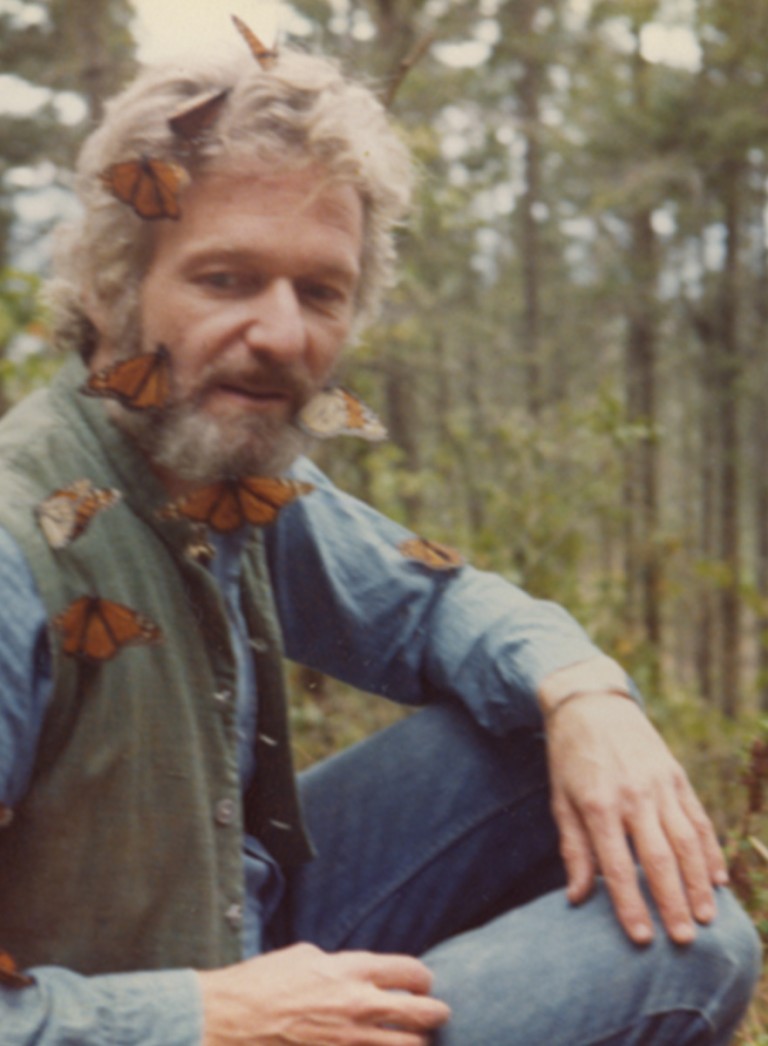
Monarch butterfly sanctuary c. 1979 Photo: Pedro Friedeberg
Works in Mexico City on drawings, watercolors and, boxes that will later be bought by the Claude Bernard Gallery in New York.
Death of Bridget Tichenor and moves to Tabasco street in the Roma district of Mexico City.
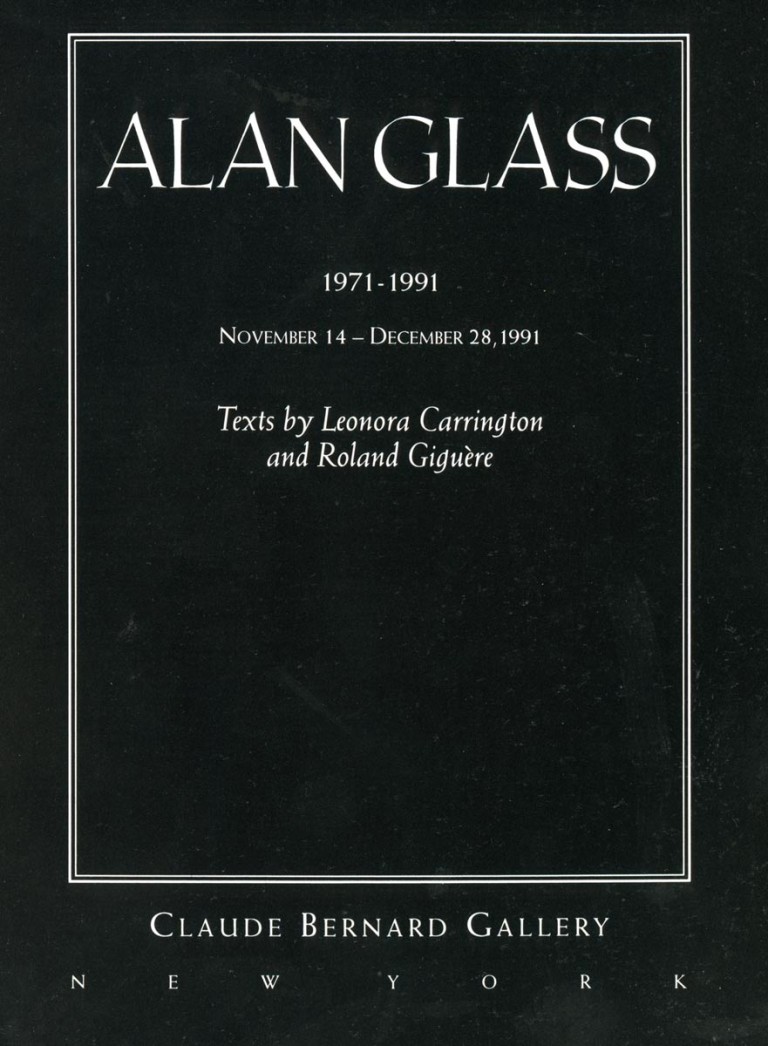
Catalogue from the exhibition at the Claude Bernard Gallery, New York, 1991.
Exhibits at the Claude Bernard Gallery in New York.
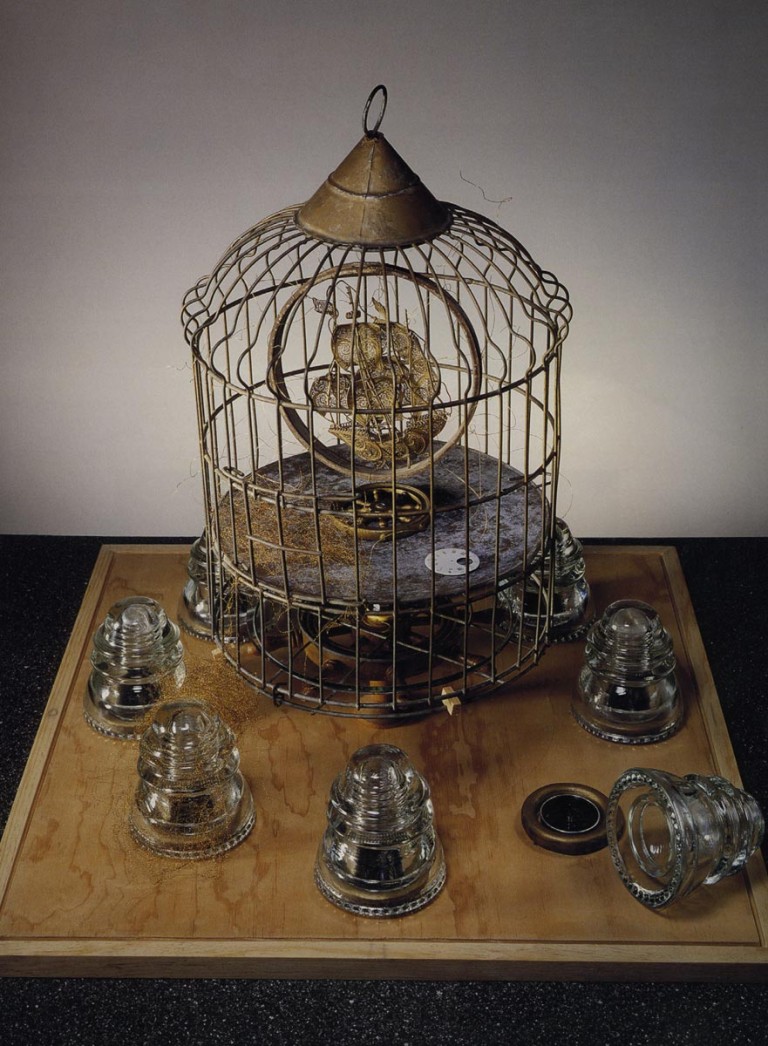
Vers l'Ors du temps
Presented by the Claude Bernard Gallery at Chicago’s International Art Fair.
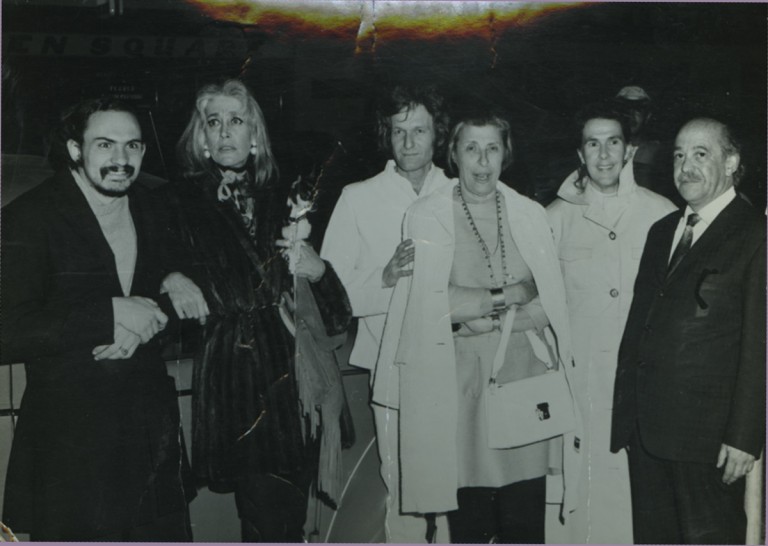
As a member of Mexico’s National System of Art Creators, Alan Glass receives a grant and proceeds to prepare two exhibitions in Mexico.
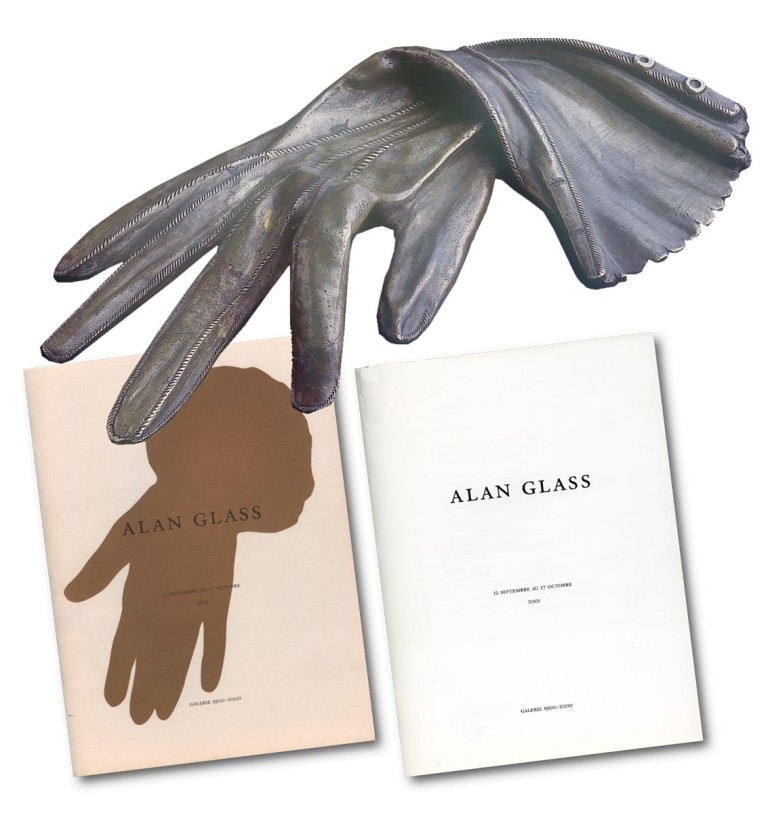
1900–2000 Gallery catalogue, Paris, 12 Sept–17 Oct 2001
Exhibition at the Galerie 1900-2000 in Paris from September 12 to October 17.
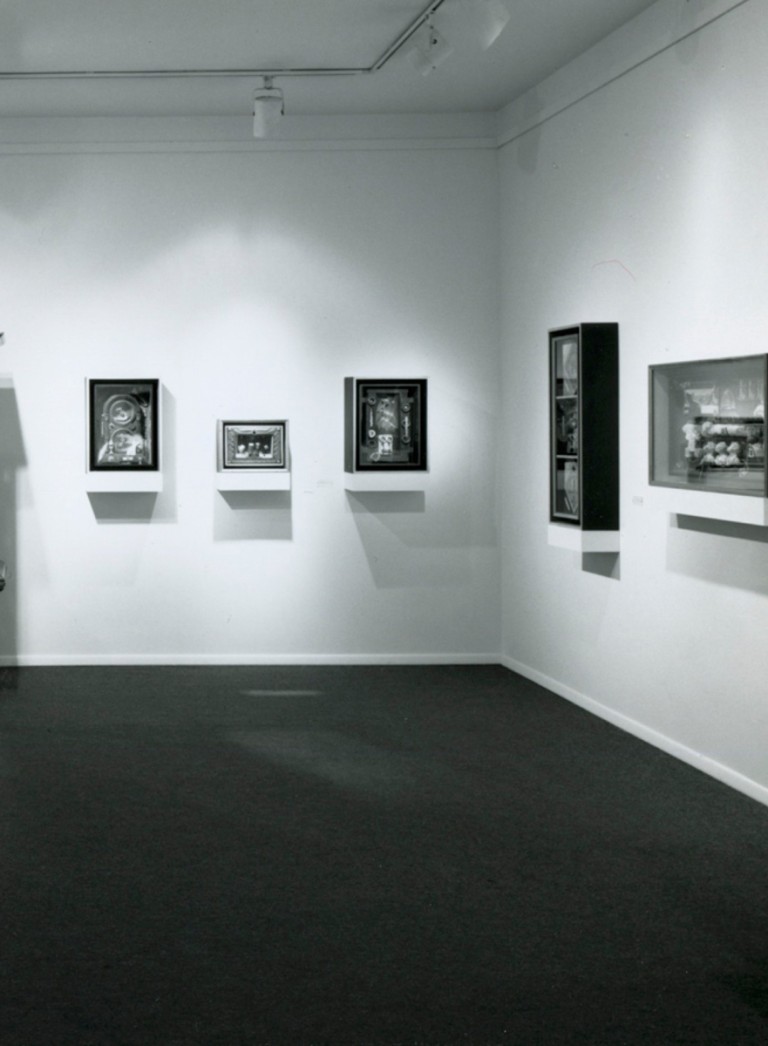
Claude Bernard Gallery, New York
He is represented by the Claude Bernard Gallery at the Brussels International Art Fair.
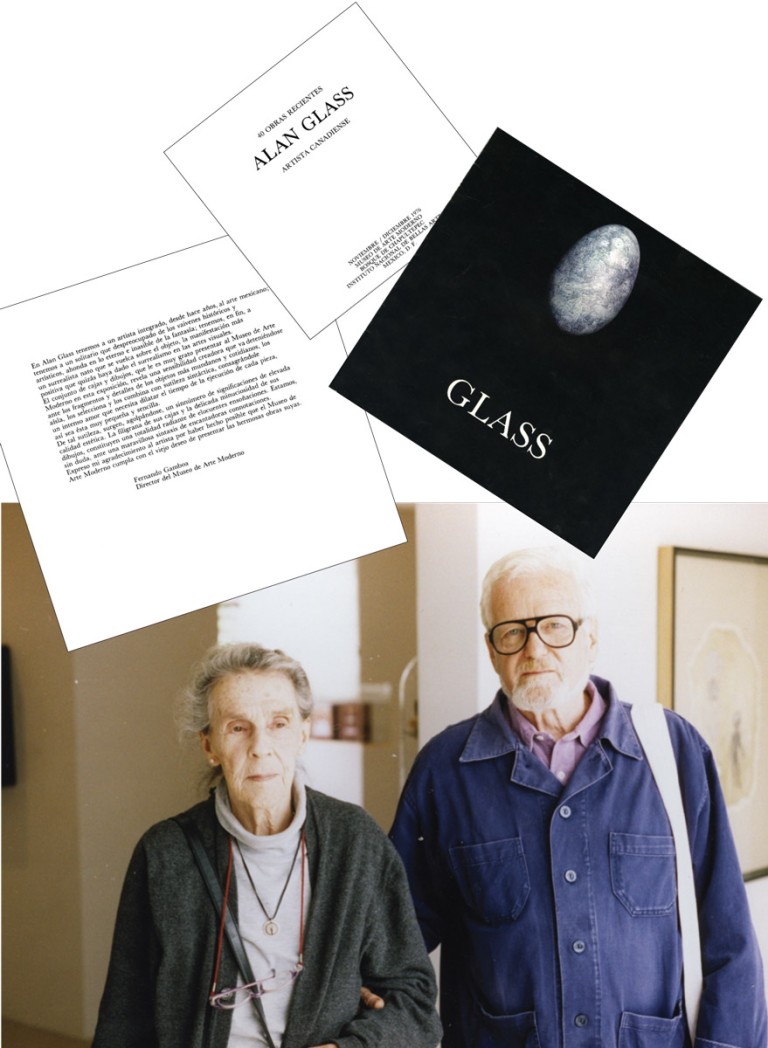
Leonora Carrington and Alan Glass. Exhibition at the López Quiroga Gallery, Mexico City. Photo: Ramón López Quiroga, 2003
Exhibition “El Arcoiris Nocturno” at the López Quiroga Gallery in Mexico City from the 29th of May to the 5th of July and at Oaxaca’s Museum of Contemporary Art from the 18th of October to the 18th of November.
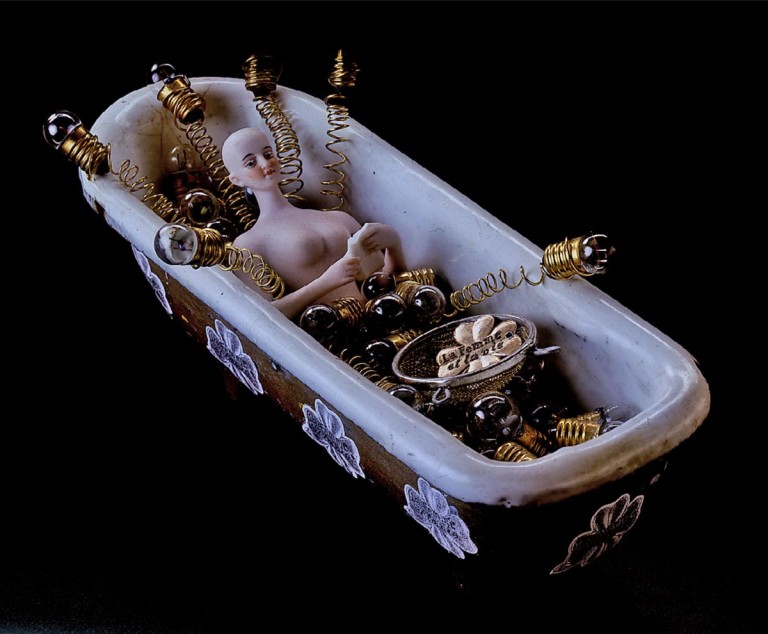
La femme et la vie, 2005.
Presented by the Galerie 1900-2000 at ARCO, Madrid.
At the López Quiroga Gallery in Mexico City, from August 20th to September 17th, he exhibits box-objects and a publication entitled La Unidad del Múltiple consisting of 20 numbered engravings, 2 collages, and a poem by Leonora Carrington, in a limited edition of 21 copies.
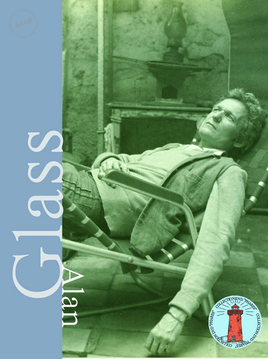
Takes part in an exhibition in tribute to Joseph Cornell at the Utopia Parkway Gallery in Madrid.
Filming of the documentary on Alan Glass Through A(lan) Glass, by Tufic Makhlouf Akl. (55 minutes in digital format) 2003-2006.
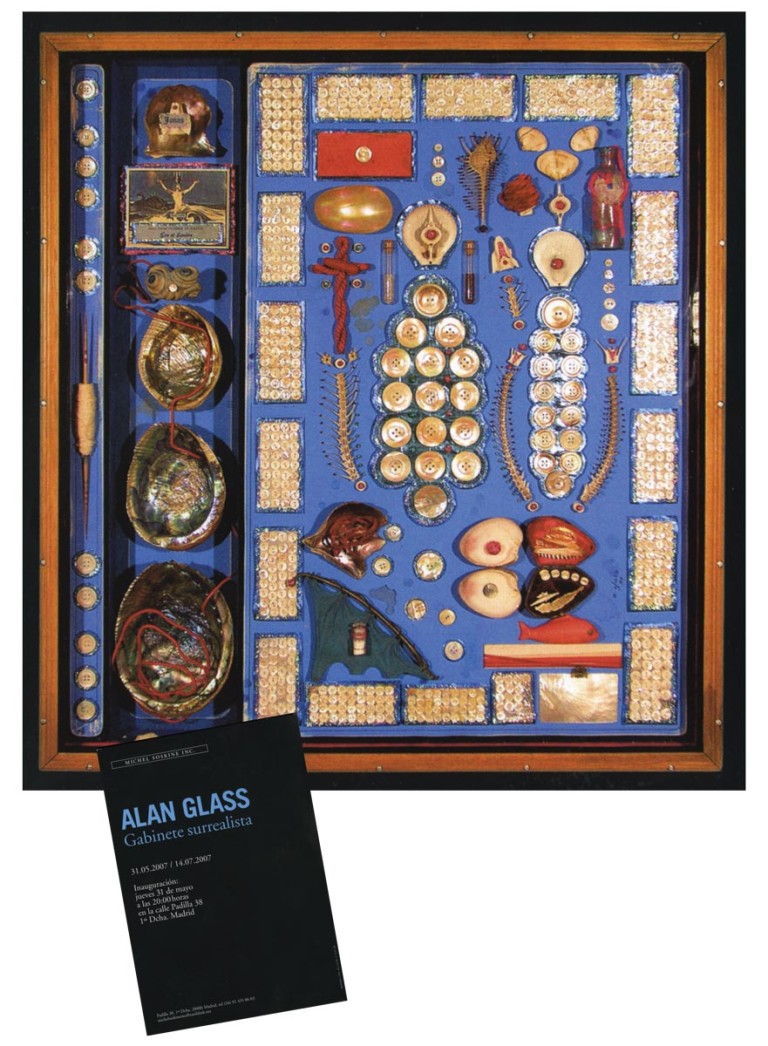
Invitation à l’exposition Cabinete Surrealista, galerie Michel Suskine à Madrid, 2007.
Solo exhibition at Madrid’s Michel Soskine Gallery Inc Gabinete Surrealista, from 31st of May to the 14th of July.
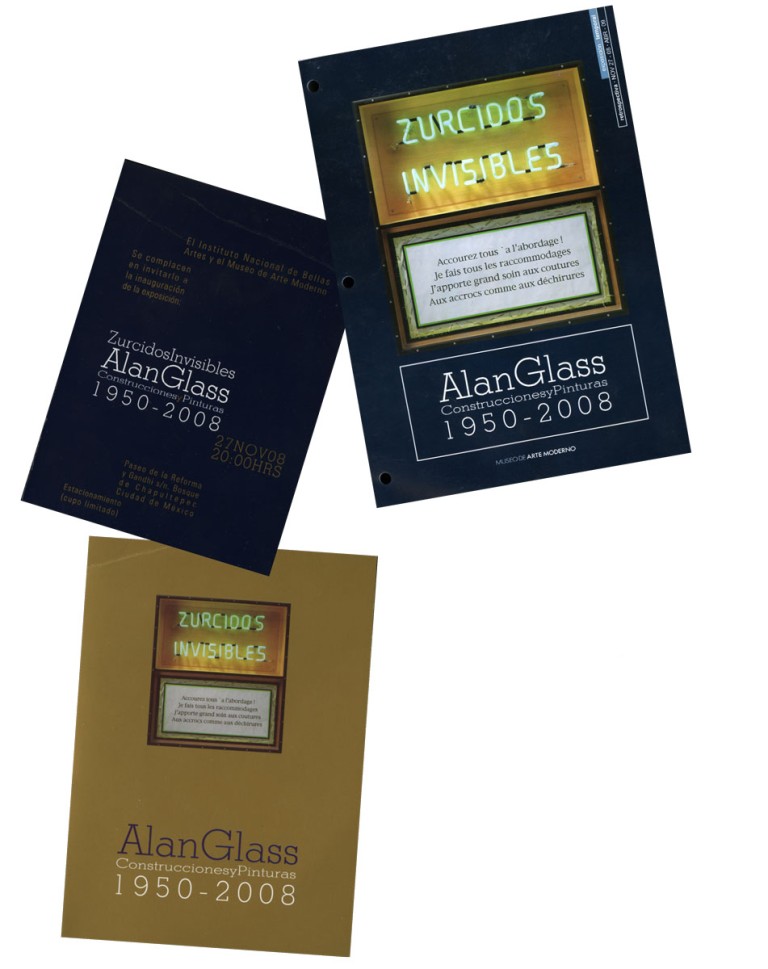
Invitation to the retrospective exhibition 1950-2008, Museum of Modern Art, Mexico City. 27 November 2008 to 26 April 2009.
Mexico City’s Museum of Modern Art assembles 150 of his works in a retrospective exhibition 1950-2008, Zurcidos Invisibles, running from November 27th to the 26 of April and curated by Masayo Nonaka.
Publication of Alan Glass’s Scrapbook.
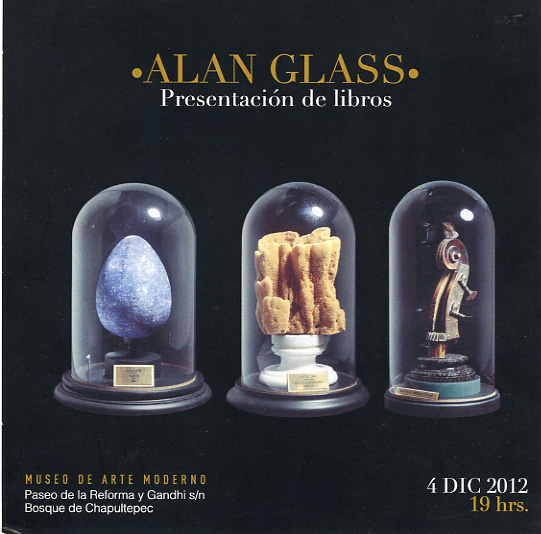
Invitation to the book launch at the MAM, Mexico City, 2012.
On December 4th, 2012 the publications Alan Glass and Alan Glass Scrapbook are presented at the Museum of Modern Art in Mexico City, completing an
in-depth overview of Alan’s biography and work.
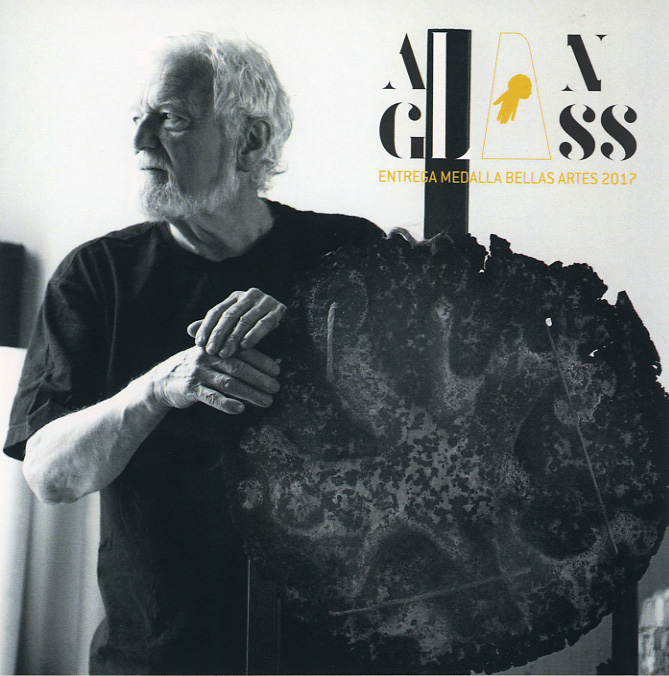
Invitation to the presentation of the Bellas Artes medal, 2017.
On November 15, 2017, the Ministry of Culture awards him the Bellas Artes medal at the Palacio de Bellas Artes in Mexico City.